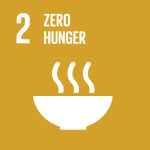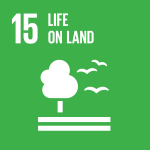
In Zimbabwe, Zephaniah Phiri was a pioneering figure who transformed drylands into thriving ecosystems. His work turned barren landscapes into lush, fertile gardens, defying the odds and showing that even the most inhospitable areas could support life, including livestock.
Phiri’s innovative methods have inspired numerous works, such as The Water Harvester by Mary Witoshynsky, which chronicles key moments from his life, and Rainwater Harvesting for Drylands and Beyond by Brad Lancaster, which offers practical guidance for harvesting rainwater.
In the semi-arid Zvishavane District, Phiri is regarded as a local hero. His ability to manage water resources in an area prone to severe drought — a phenomenon predicted to increase by 21 percent over the next 20 years — helped his land flourish even under extreme conditions. Phiri’s creation of large-scale water storage systems moderated the seasonal variations, enabling the land to thrive with rich plant cover and healthy soils.
“Friends, if starvation comes to the land, I can at least be sure that I will have food for three days longer.” – Phiri, gesturing towards his thriving garden. Although he passed away in 2015, his work continues to inspire and guide sustainable practices in the region.
Carrying forward Phiri’s legacy
Muonde Trust, founded in honour of Phiri’s vision, builds on local knowledge and traditions rather than importing external solutions. The organization focuses on implementing water harvesting and agroecological techniques to address the growing challenges of rainfall variability, particularly among the Indigenous Vangowa people of Mazvihwa and surrounding areas in south-central Zimbabwe.
With support from the UNDP-Adaptation Fund Climate Innovation Accelerator (AFCIA), Muonde Trust has trained 30 women and 20 men from local farming communities. These farmers receive education on water harvesting techniques, dry stone walling and the regeneration of forests. Once trained, the farmers share their newfound knowledge with others, fostering a spirit of collaboration and mutual empowerment.
The work of Muonde Trust is deeply rooted in the culture of the community. For example, in Mazvihwa’s Ward 16, a local garden implemented sand abstraction, a technique that draws water from beneath dry riverbeds. This water is used to irrigate community gardens, alleviating the impact of drought. When the garden was established, local chiefs visited to bless the project, underscoring the spiritual and cultural significance of the initiative.
“The Chiefs connect every initiative to the ancestors by blessing it for success. Their presence strengthens the connection between the social, spiritual and ecological values, fostering community ownership and amplifying the importance of the initiative.” – Dr. Abraham Ndhlovu, Executive Director at Muonde Trust

Dry stone wall construction. Photo: Muonde Trust
Strengthening women’s leadership and climate resilience
The positive impact of these water-harvesting practices is particularly evident among women in the community. In Mazvihwa, 80 percent of the new sand abstraction plots were allocated to young women. Historically, women have played a crucial role in ensuring food security through horticultural gardens along rivers. By focusing their support on women, Muonde Trust enhances agricultural efficiency, reduces their daily labour burden and promotes gender equality. This shift is not only changing the dynamics of local agriculture but also contributing to greater economic stability and food security for all.

Community members work on the live hedge fencing. Photo: Muonde Trust
Expanding the reach of Phiri’s vision
In just a few months, Muonde Trust trained five farmers to become trainers. These trainers have since shared their knowledge with other farmers and begun building ‘swales’ — channels designed to capture and store runoff water. Training sessions focus on simple yet effective techniques, such as marking outlines across a slope for rainwater harvesting and constructing ponds for water storage. Farmers are equipped with basic tools like A-frames, made from three sticks, string and a stone, to measure and create these water-capturing systems.
“The water that has been flowing to rivers and streams is the water we are now harvesting to increase our production and incomes. This is phenomenal.” – Bernard Malunga, farmer from the Gudo Cluster
In addition to swales, dry stone walls and live hedges are vital components of the landscape transformation. These structures prevent soil erosion, conserve trees and mark arable and grazing land. The construction process, though labour-intensive, brings the community together. Tools such as wheelbarrows, hammers and shovels are shared collectively, reinforcing the importance of teamwork.
Since the project’s inception, nearly 700 metres of dry stone walls and more than 800 metres of live hedge fencing have been constructed.

School students attend rainwater harvesting sessions to learn how to measure with A-frames. Photo: Muonde Trust
Protecting the environment and Phiri’s lasting legacy
In Ward 16, two 2-hectare forestry plots have been developed. In response to the positive impact of Muonde Trust’s work, Chief Mazvihwa and his headman have established their own Environmental and Forestry Protection Committees. These committees are tasked with monitoring and protecting local forests to prevent indiscriminate tree felling, ensuring the sustainability of natural resources in the region.
The efforts of Muonde Trust have brought about significant and lasting changes. Zephaniah Phiri, during his lifetime, expressed excitement at the deep transformation he witnessed, not only on his farm but across entire landscapes and watersheds, particularly in Mazvihwa. His vision lives on through the work of Muonde Trust, which continues to spread the principles of “talking with water” and “rhyming with nature” — two expressions Phiri often used to describe his relationship with the land and water.
Muonde Trust remains steadfast in its commitment to Phiri’s legacy, promoting sustainable water harvesting and agroecological practices that empower communities and build climate resilience.
*
Supported by financial contributions from the Adaptation Fund and the European Union, the UNDP-AFCIA programme has awarded 44 micro and small grants to locally led organizations across 33 countries worldwide, accelerating their innovative solutions to build resilience in the most vulnerable communities.
UNDP-AFCIA is one of two featured programmes under the Adaptation Innovation Marketplace (AIM), a multi-stakeholder strategic platform that promotes scaled-up adaptation at the local level.





